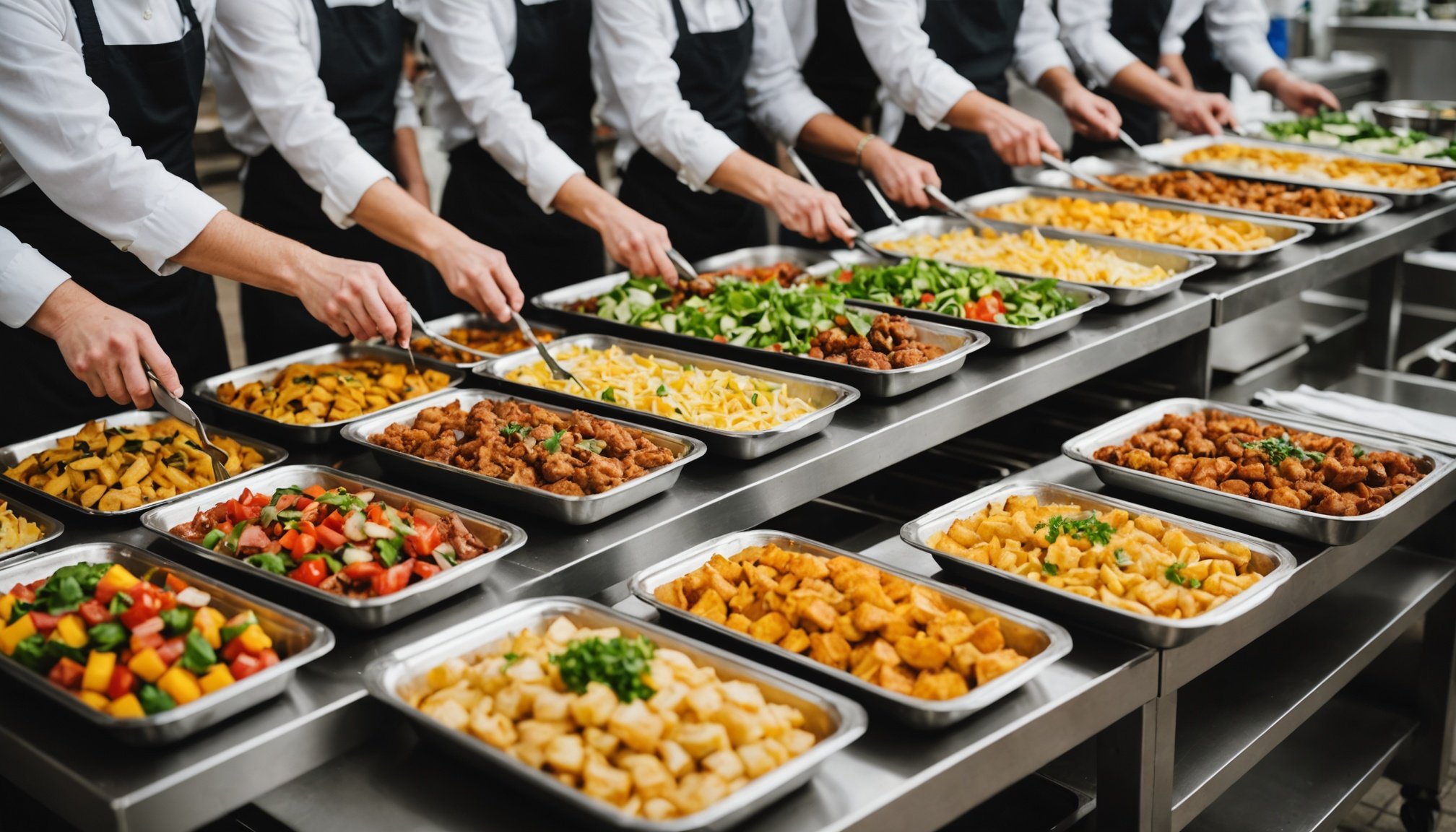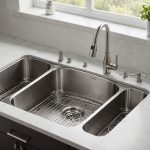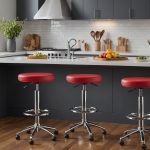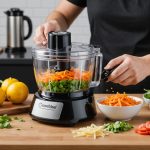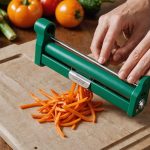Essential Kitchen Equipment
In the culinary world, having the right mix of kitchen tools and catering equipment is indispensable. Whether you’re running a small catering business or preparing for a large event, understanding the culinary essentials is key for delivering top-quality dishes efficiently.
Must-Have Tools: Chefs and caterers should invest in high-quality kitchen tools such as sharp knives, durable pots and pans, and versatile kitchen gadgets like food processors. These are essential for performing a range of tasks from preparation to serving.
Have you seen this : Transforming customer service training in upscale dining: key strategies for excellence
Quality Matters: The importance of investing in high-quality catering equipment cannot be overstressed. Superior tools not only enhance efficiency but also contribute to the precision and presentation of dishes. They are more durable and often last much longer, proving cost-effective over time.
Commercial vs. Residential Tools: When it comes to culinary essentials, there’s a crucial distinction between commercial and residential tools. Commercial tools are designed for handling larger quantities and have enhanced durability. While residential tools can be more economical for smaller operations, they may not withstand the demands of high-volume catering.
This might interest you : Transforming family dining experiences: unleashing the potential of interactive tabletop games
Understanding the nature of the event and the scale of your catering operations will guide your decisions regarding the right culinary essentials.
Essential Kitchen Equipment
Exploring the vast realm of essential kitchen equipment begins with identifying the must-have kitchen tools for catering. A chef’s arsenal typically includes items such as versatile kitchen gadgets, precise measuring tools, and high-quality baking sheets. Each piece serves a unique purpose and is crucial for delivering memorable dining experiences.
One cannot overlook the importance of investing in high-quality cooking equipment. Superior quality tools not only improve cooking efficiency but also uphold the standard of your culinary creations. Durability is a key factor here; high-quality items often withstand the rigours of consistent use, proving to be a cost-effective choice in the long run.
When deciding between commercial and residential tools, understanding their distinctions is essential. Commercial kitchen tools are built to handle large-scale operations with enhanced performance and durability. In contrast, residential tools, though suitable for smaller-scale cooking, may not withstand extensive use in professional settings.
By carefully choosing the right equipment based on the scale and nature of your catering business, you set the stage for culinary success. Emphasizing the practicalities of each tool not only enhances service quality but also streamlines kitchen operations, ensuring you meet and exceed client expectations.
Catering Software Solutions
In the rapidly evolving catering industry, adopting the right catering management software can significantly streamline operations. Such software typically offers key features like customized scheduling tools and invoice management systems, which are indispensable for smooth event execution and financial handling. One essential component is robust scheduling tools that help organise staff shifts and timelines efficiently, avoiding any potential overlaps or shortages.
Using technology for scheduling and invoicing not only reduces the opportunity for human error but also saves precious time, allowing caterers to focus more on client satisfaction and less on paperwork. This digital approach enhances productivity, ensuring every project runs like a well-oiled machine.
When selecting event planning software, it is crucial to evaluate solutions that offer an intuitive interface and comprehensive functionalities tailored to the unique demands of catering services. Opting for the right software can boost communication, as it allows seamless coordination between all stakeholders.
Recommended software often includes solutions like Caterease or Total Party Planner, known for their user-friendly designs and extensive feature sets that cater specifically to the catering sector. Investing in these technologies empowers catering businesses to enhance efficiency and elevate service quality.
Food Storage and Transport
Maintaining food safety during transport is a top priority for caterers. Key practices include keeping food at the correct temperature and using insulated containers to prevent contamination. Ensure that hot foods stay above 63°C and cold foods below 5°C, vital for avoiding the danger zone where bacteria thrive. Adopting these strategies preserves the quality and safety of the culinary offerings.
Choosing the right storage solutions is crucial. Essential containers include airtight and stackable bins that efficiently protect food from external elements. These containers should be durable, leak-proof, and easy to clean. By utilising the appropriate storage solutions, caterers can ensure that food remains fresh and ready to serve upon arrival at the venue.
Avoiding common pitfalls in food transport is essential. One notable mistake is neglecting to secure containers properly during transit, which can lead to spills and compromised food quality. Additionally, failing to label containers might result in misplaced items, causing logistical issues.
Implementing a thorough checklist for food transport can prevent such oversights. Using durable, labelled containers, maintaining correct temperatures, and vigilant handling during transport are indispensable strategies for ensuring food arrives in pristine condition.
Staffing and Management Tools
Efficient catering staff management is crucial for the seamless operation of any catering business. Tools that streamline scheduling, assignments, and performance tracking are indispensable. Software solutions like Planday and Sling are popular, offering features that help manage rosters, track work hours, and ensure all tasks are allocated effectively.
Equally important is fostering effective communication among team members. Platforms such as Slack or Microsoft Teams provide instant messaging, video calls, and project management capabilities, facilitating real-time updates and collaboration. These tools minimize misunderstandings and streamline workflow, ensuring smooth execution of events and services.
Securing a skilled team requires robust hiring solutions. Services like Indeed or LinkedIn are essential for reaching a vast pool of potential candidates. Leveraging these platforms enables you to post job listings, screen applications, and schedule interviews seamlessly, ensuring you assemble a talented team tailored to your business requirements.
By integrating these tools into your operations, you not only enhance staffing efficiency but also build a cohesive team equipped to deliver exceptional service at every event. Prioritizing management solutions underscores your commitment to professional integrity and client satisfaction.
Supplies and Inventory Management
In the bustling world of catering, efficient inventory management is vital for seamless operations. Knowing the importance of tracking supplies ensures that each event runs without a hitch, avoiding last-minute disruptions due to inadequate resources. Implementing robust order management tools can greatly aid in organizing and streamlining these processes.
Essential catering supplies vary based on the types of events served, yet core items remain constant. These include items like chafing dishes, elegant serving platters, and various-sized utensils tailored to specific culinary demands. Keeping a well-stocked inventory of these essentials is crucial for maintaining service quality and guest satisfaction.
Effective inventory tracking is facilitated by digital solutions that provide real-time updates on stock levels. These tools help prevent over-ordering and under-supply situations. Using software tailored for order management, caterers can easily monitor usage patterns, predict future needs, and adjust orders accordingly, ensuring cost-efficiency and resource optimization.
By utilizing these strategies and tools, caterers can focus more on the culinary aspects and less on logistical management, paving the way for consistently successful events. Balancing essential supplies with precise inventory management reinforces operational stability and enhances service delivery.
Marketing and Branding Tools
In the competitive world of catering, effective catering branding is crucial for standing out. Focus on creating a compelling logo and memorable slogan that capture the essence of your services. Consistency across all materials, from business cards to online platforms, reinforces your brand identity. Through clever graphic design and targeted messaging, chances of leaving a lasting impression increase significantly.
To attract clients, embracing innovative marketing strategies is essential. One approach is hosting pop-up events showcasing samples of your offerings. These events generate buzz and allow potential clients to experience your culinary creations firsthand. Collaborating with local influencers to feature your services in their content can further expand your reach and potential client base.
Leveraging social media tools optimises engagement. Platforms like Instagram and Facebook offer opportunities to showcase vivid images and behind-the-scenes stories of your operations. Using analytics tools such as Hootsuite or Buffer can aid in understanding viewer demographics and engagement metrics, allowing for more targeted and timely posts. Engaging directly through comments or messages builds a connection with your audience, encouraging repeat business and referrals.
By combining strong branding with modern marketing techniques, catering businesses can effectively capture and retain the attention of their desired clientele.

